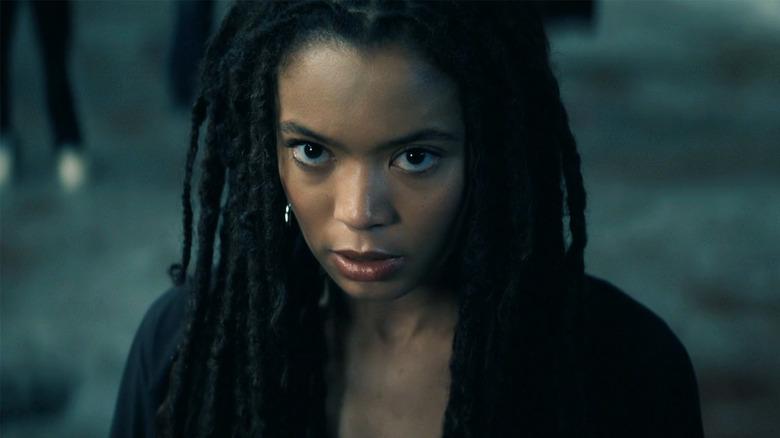Okay, deep breaths everyone. I just finished "The Guardians of Godolkin" and my brain is actually melting. Can we just acknowledge that Gen V officially stopped being the "spin-off" and became the main event? This wasn't just a finale; it was a brutal, bloody graduation ceremony from hell that makes the main show look like a Saturday morning cartoon.
My Personal Rating: 9.8/10 (I’m still shaking, honestly. My heart can't take the stress, but my soul needed this.)
The "Godolkin" Twist (I’m literally screaming)
First off, that flashback to 1967? Seeing Thomas Godolkin inject himself with V1—the original Soldier Boy/Stormfront juice—was a total "holy sh*t" moment. It explains why he looks like he’s in his 30s while being a literal dinosaur, but it also highlights Vought’s biggest fear: uncontrollable power. Modern Vought wants "disposable" Supes they can market and replace like iPhones. Godolkin is a relic of pure, unadulterated Supe-supremacy.
But the real kicker? The "Doug" reveal. Knowing that poor VCR repairman was a conscious prisoner in his own body for thirty years while Godolkin used his face to build "The Woods" and run the "Odessa" project... that is peak The Boys level of messed up. It’s a level of psychological horror that really makes you realize the Supes aren't the only monsters—it’s the creators. I felt physically sick for Doug. His death by Black Noir II wasn't just a cleanup; it was Sage erasing the only witness who could have dismantled the entire Vought legend.
Sister Sage: Even Geniuses Mess Up
I loved watching Sage get a reality check this episode. She’s been playing 4D chess all season, but she forgot one thing: Godolkin isn't a "piece" you can just move. He’s a creature of pure, ravenous ego. Seeing her "Phase Two" crumble because he wanted to play Eugenics God was so satisfying. Sage is all logic, but Godolkin is all sensation and god-complex.
When she left Polarity’s cell door open? That wasn't kindness. That was Sage being the cold, calculating queen we love to hate. She realized her "asset" was a "bad product," so she pointed a loaded gun (Polarity) at the problem and walked away to recalculate. The scene where she questions him about love and pain wasn't empathy—it was her trying to figure out the "human variable" she keeps failing to account for. She is basically a Supe version of Stan Edgar, but even more terrifying because she can see every move before you make it.
OUR SQUAD. THE GROWTH. 😭
Can we talk about the unity? This season has been a crucible for these kids, and seeing them finally click was everything.
Marie & Kate: When Marie healed Kate? I actually cried. After everything Kate did under Shetty’s influence, that act of forgiveness was the ultimate middle finger to Godolkin’s "survival of the fittest" BS. It proved that empathy is a bigger power than blood-bending.
Emma: Seeing her grow giant fueled by pure love for her friends instead of her eating disorder or public perception? That’s her best moment in the series. Period. She’s finally the master of her own body, not a victim of it.
The Reject Power Play: Using the "Trojan butthole" teleporter (poor Vance!) to smuggle the team in was pure Gen V. It’s the perfect metaphor: the "useless" performing arts students Godolkin wanted to cull are the ones who ultimately took him down.
THE HEAD POP.
Marie Moreau. My girl. She didn’t just level up; she went full Victoria Neuman, but with a conscience. When Godolkin tried to puppet her into killing her own friends—forcing her to relive the trauma of her parents' death—I was holding my breath. But that split second where she broke his control and popped his head? I was screaming at my screen. She’s not a scared girl from the Red River Institute anymore. She’s a leader, and she’s officially the Resistance's nuclear option. We have our own head-popper now, guys!
THAT ENDING. (The Crossover We Deserve)
I actually gasped when Starlight and A-Train showed up. Seeing A-Train—the guy whose poster was on Marie’s wall in the pilot, the guy who used to be the face of Vought corporate greed—now standing there as a true hero? Talk about a full-circle redemption arc.
When he told the Gen V crew, "You guys are f**king rebels now. Just act like it," it felt like the ultimate passing of the torch. The "Guardians" aren't just kids anymore; they're the front line of the war against Homelander.
Final Thoughts for 'The Boys' Season 5
The walls are down, guys. This ending tears the two shows together into one massive, final-season collision course.
The New Resistance: With the main 'Boys' squad mostly captured or on the run, this new team—Marie (Head-popper), Jordan (Tank), Sam (Brawler), Kate (Mind-control), and Emma (Giant)—is a literal Supe Black-Ops unit.
Polarity as the Boogeyman: Expect Vought to paint Polarity as a "Supe Terrorist" to justify Homelander’s fascist crackdown. He's taking the fall so the kids can be the secret weapon.
The Title Reclaimed: Vought tried to brand them "The Guardians of Godolkin" as a hollow PR slogan. Well, they earned the name now. They're guarding the world from the system that created them.
What did you guys think? Is Marie officially more dangerous than Neuman now? And can we talk about Annabeth’s pre-cog powers being the potential checkmate for Homelander? Let’s obsess in the comments.



No comments:
Post a Comment